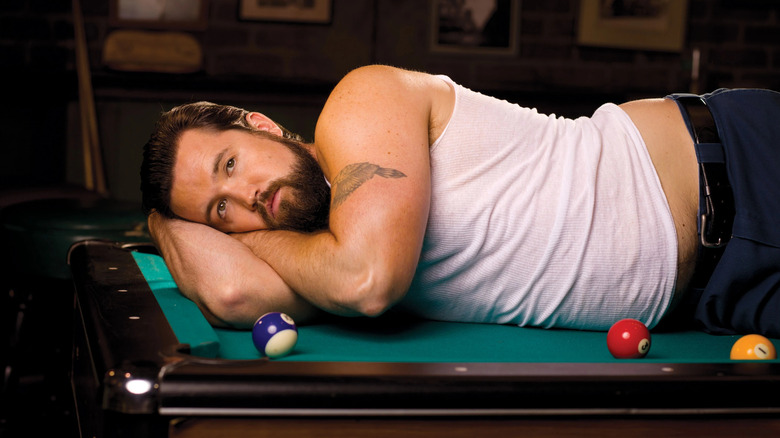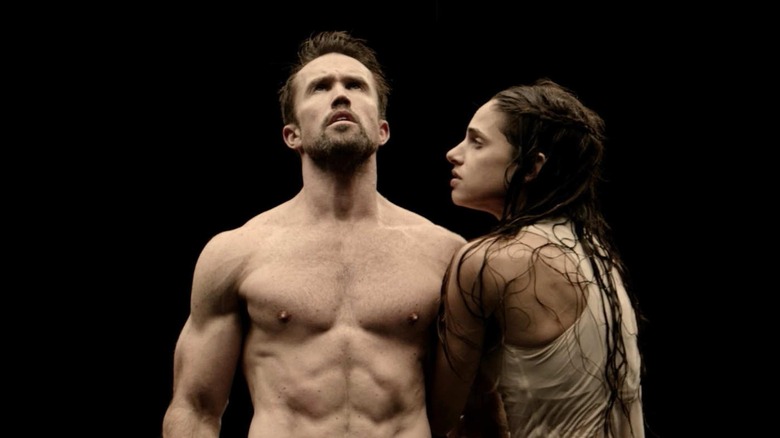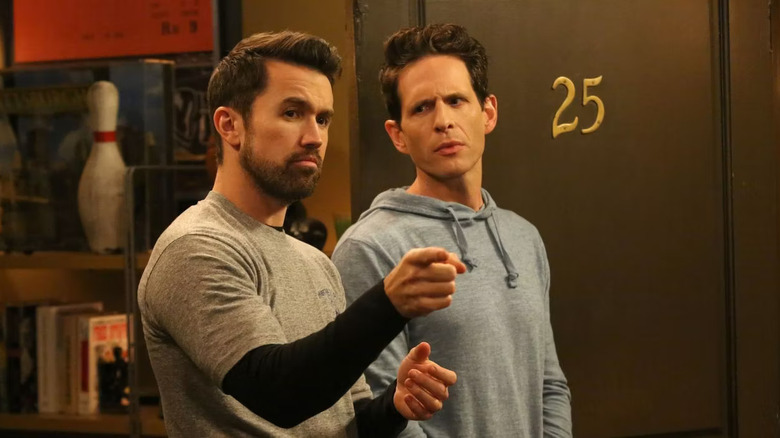It's Always Sunny In Philadelphia Didn't Always Plan To Make Mac Gay
Although Mac (Rob McElhenney) is now an out and proud gay man, the writers of "It's Always Sunny in Philadelphia" did not always plan for that to be the case. Despite subtle hints towards his sexuality in the early seasons, it was not until a decade after the show's premiere that McElhenney decided to make it official. While those old clues were originally just intended as throwaway jokes, they retroactively allowed for Mac to be developed as a gay character on purpose in later seasons. After years of exuding the uber-masculine stereotype, the series found a way to flip the characterization on its head and still stay true to Mac.
As one of the most despicable individuals in the series, the reveal of Mac's true sexual orientation had to find the right balance of thoughtfully addressing the moment while keeping up his self-serving attitude (he ultimately comes out of the closet in order to win a lottery scratch card). McElhenney detailed to Rolling Stone how, through trial and error, "It's Always Sunny" was able to seize the situation without breaking the mold of the long-running comedy series.
Realizing who Mac always was
In the interview, McElhenney broke down the thought process behind the major decision, explaining that it already spoke to how he portrayed Mac over the years. "It was actually born more out of his intense, ultraconservative, right-leaning principles," he explained, adding that taking the next step and revealing him to be gay was the show's patented satirization of the "hard Christian conservative" coming out in full force.
In "It's Always Sunny" season 11 we were confronted with the fact that Mac is actually gay when he and the gang went on a Christian cruise led by a gay couple, who briefly convinced him to come out the closet. However, he returned to the closet by the end of the two-part finale as part of a running gag about Mac being in denial. The intention was not to make fun of the fact he was gay, but it led to a "massive outpouring from our LGBTQ fans, who were really upset," according to McElhenney. He admitted that the show had "an opportunity there, and we screwed it up."
Later on, however, the show finally let Mac out of the closet for good, changing the status quo for the character indefinitely. McElhenney talked about how it felt finally finding the sweet spot for Mac:
"It felt good that we were recognizing a part of our audience in a way that was not pandering, that wasn't offensive or upsetting or a caricature. We weren't creating a gay character for comedic effect, that was there just to be gay and to be funny because he was gay, but a very complex, very disturbed, very f*****-up and awful character, who happens to be gay. And we ran with that."
Not only did they run with it, but McElhenney understood that the endeavor meant also upholding Mac's deporable personality.
Keeping true to Mac
Although "It's Always Sunny" does not evolve its characters beyond minor changes, Mac is the probably the most developed of the gang. The realization of his true self is a retroactive byproduct of his personality, but it did serve as a means of pushing the character forward ever so slightly. This is exemplified in the episode "Mac Finds His Pride," where the show veered off its usual comedic axis and established Mac's inner personal struggle in a contemporary dance that even brought Frank (Danny DeVito) to tears.
However, Mac coming to terms with being an openly gay man did not deter him from being a very bad person. Having fun with awful, self-serving characters is a part of what makes the show special, and McElhenney did not want to lose that with Mac. Entertainment Weekly spoke to McElhenney about revealing Mac's sexuality without making him a better individual in the process:
"...that was something we made a concerted effort on, to make sure we were servicing a very large part of our community, which is the LGBTQ community, and we wanted to make sure that we were having a character who was going to come out in a way that would feel satisfying and be in the tone of 'Sunny,' while also not just all of a sudden dramatically changing Mac's character, because that just wouldn't resonate with 'Sunny.'"
The fact that "It's Always Sunny in Philadelphia" was able to balance meaningful LGBTQ+ representation with its degrading humor just goes to show how much thought goes into the madness we see every episode. As the show continues its record-breaking run on television, it seems inevitable that McElhenney and crew will continue to impress for years to come.


